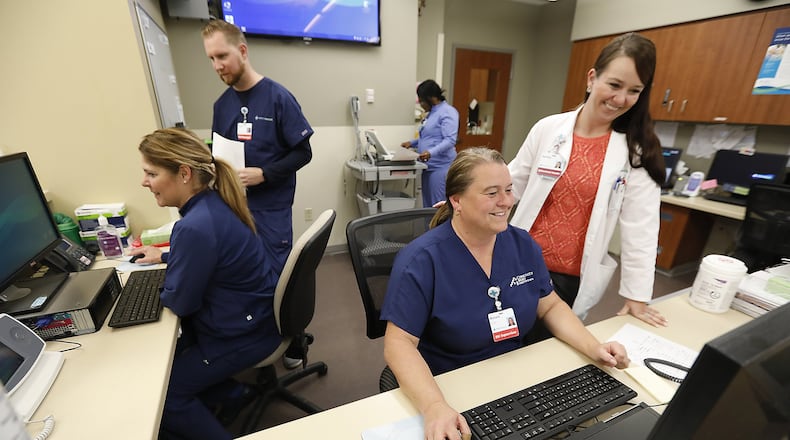The three-year grant from ServeOhio — the state legislature’s commission on service and volunteerism — will provide two AmeriCorps volunteers to provide screenings to patients at the Springfield hospital’s emergency room who may use or be at-risk for drug use. The grant targeted areas in Ohio that have experienced an increase in opioid overdoses with drug-related mortality rates above the state and national averages.
“If we can discover (a drug issue) through that screening, we’re going to be further down that road to support recovery for as many people as possible,” said Marianne Potina, Vice President for Mission Integration at Mercy Health – Springfield.
A record 97 people have died of drug overdoses this year, Clark County Coroner Dr. Richard Marsh said. Local law enforcement have responded to more than 1,000 drug overdoses this year, Clark County Prosecutor Andy Wilson said.
The SBIRT screenings (Screening, Brief Intervention and Referral to Treatment) identify patients who may abuse drugs or be at-risk for drug use and provide them with early intervention opportunities. The program began earlier this year using federal money to hire behavioral health technicians to perform the screenings.
“Even if they come in with something unrelated to opiate use or drug use, we’ll still be screening everybody,” said Brian Gray, director of business development for Behavioral Health Services at Mercy Health. “If we find out during the screening process that they may need extra help or a family member needs help, we want to make sure we’re able to get those patients in treatment and do a warm hand-off process as much as possible.”
MORE: $213K grant will open Springfield safe house for drug addicts
The warm hand-off program created by local officials earlier this year will place a licensed chemical dependency therapist and a peer support recovery specialist at the ER to speak with addicts about treatment options.
McKinley Hall — a local drug and alcohol treatment facility — has staff members who will be working 3 p.m. to 11 p.m. to provide assistance to people who need help with drug use, Potina said. The AmeriCorps volunteers will likely fill in the gaps during other shifts, she said.
“It will be an additional support to what we’re already working on,” Potina said.
The grant will provide for a total of 10 AmeriCorps volunteers at five different hospitals, including three in Cincinnati and another in Willard, Ohio, which have also experienced a spike in overdose deaths. Mercy Health also will provide about $54,000 in matching money.
RELATED: Springfield recovery advocate’s overdose death shows relapse battle
Nurses have also been trained to screen patients, if technicians aren’t available, Gray said. The SBIRT program has performed more than 2,500 screenings in Springfield through September and have referred more than 70 people for alcohol and drugs, Gray said. Across the Mercy Health system, more than 50,000 people have been screened.
“We just want to make sure people know about the options for treatment and are able to get it,” he said.
Several new programs have been implemented to fight the opioid crisis, including a voluntary in-patient detox program and prescription drop boxes, Potina said.
Doctors are also no longer prescribing narcotics to patients for issues non-related to real pain, such as a broken bone, she said. Fewer patients are coming to the ER, Potina said.
“One could say possibly it’s because the people who were seeking those drugs know that we’re not going to distribute those,” she said.
SPRINGFIELD’S OPIOID WAR
Springfield ex-addicts: Recovery possible
‘Perfect’ Springfield couple battles addictions, finds recovery
Springfield native living clean, successful after prison, addiction
Addicts, family members share stories at Springfield recovery banquet
More prevention needed to curb opioid epidemic in Springfield
New program seeks to reach Clark County overdose patients, save lives
S pringfield churches unite to open recovery house for addicts
Safe h ouses for Springfield overdose patients might save lives
Drug epidemic wreaking havoc on Clark County businesses, economy
Drug crisis traumatizing children in Clark County, state
Money used to fight Clark County drug crisis at risk
More than 100 Clark County law enforcement officers to get Narcan kits
Springfield examines officer, medic safety after Ohio police overdose
Demand for, debate over Narcan soars in Springfield
20 more overdoses in Clark County during 25-hour stretch
Clark County sees another big spike of at least 40 overdoses in 5 days
Clark County leaders pledge to fight addiction stigma, OD crisis
Clark County to charge addicts who OD and don’t seek treatment
Overdose epidemic spreads, strains Springfield first responders
About the Author

